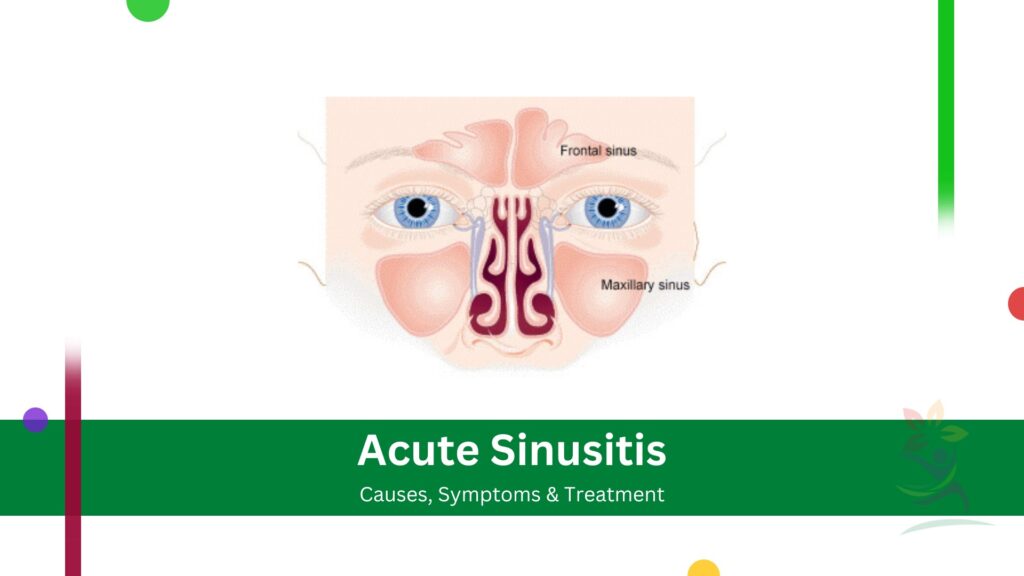Acute sinusitis is a transitory inflammation of the sinuses in which air-filled cavities surround the eyes and nose. It is caused by a fungal, bacterial, or viral infection, and can cause a wide range of other unpleasant symptoms including:
Quick Links
Toggle- Cough or postnasal drip
- Facial pain or pressure
- Nasal congestion
- Headaches
- Reduced sense of smell and taste
- Difficulty breathing through the nose
It is different from chronic sinusitis and is more persistent for lasts for 12 weeks or longer. To learn more about Alpha-Gal Syndrome Click HERE
Signs & Symptoms
Acute sinusitis symptoms vary depending on the duration and severity of the disease. Some of the common symptoms are:
- Congestion or stuffiness of the nose
- Green or yellow nasal discharge that is thick and discolored
- Pressure or pain in the face particularly in the cheeks, forehead, and eye areas
- Headache
- Reduced sense of smell and taste
- Sense of smell and taste is reduced
- Flow from nose or cough
- Fatigue
- Fever
By knowing the duration and severity of these symptoms individuals can differentiate acute sinusitis from other sinus-related conditions, such as allergies or chronic sinusitis.
GET IN TOUCH
Book An Appointment
When to See a Doctor
It is usually advised to have medical help when you are experiencing symptoms,
- If symptoms don’t get better after 10 days
- With time symptoms become severe or worsen
- If you are suffering from high fever (over 101°F or 38.3°C)
- You may have facial pain or severe headaches
- Persistent or worsening nasal discharge
- Everyday activities are interrupted by symptoms
Early medical treatment prevents the further development of complications and ensures that the underlying cause of your acute sinusitis is properly treated. If you need a consultation for your symptoms, Fitwell Hub offers expert medical consultations.
Causes
The following factors can contribute to development:
- Viral Infections: The most common causes of acute sinusitis are common cold or flu. These are viral upper respiratory infections.
- Bacterial Infections: Sometimes acute sinusitis develops through bacterial infection that can spread through the sinuses.
- Allergies: Due to some environmental irritants and seasonal allergies inflammation and swelling of the sinuses occur making them more vulnerable to infection.
- Structural Abnormalities: Some anatomical disorders, such as an abnormal deviated septum or nasal polyps, can block the sinuses by increasing the risk of acute sinusitis.
- Weakened Immune System: Individuals having weak immune systems, like those with HIV/AIDS or any other chronic disease, are more vulnerable to developing acute sinusitis.
Complications
Though acute sinusitis is a controllable condition, if left untreated it can cause severe complications or worsen the infection. These complications are:
| Condition | Description |
|---|---|
| Chronic Sinusitis | If acute sinusitis is not treated properly, it can develop into a persistent chronic form of the condition. |
| Orbital Complications | If the infection spreads to the tissues surrounding the eye, it can cause an orbital abscess or orbital cellulitis. |
| Intracranial Complications | Infection may spread to the brain or membranes surrounding the brain, leading to serious conditions like brain abscesses or meningitis. |
| Bone Complications | The infection spreading to the bones can result in osteitis or osteomyelitis. |
| Hearing Loss | Acute sinusitis can cause temporary or permanent hearing loss if the infection spreads to the middle ear. |
In cases of severe or persistent symptoms of acute sinusitis, early treatment is very important. It will prevent the further development of serious complications.
Preventions
Though it’s not always possible to prevent acute sinusitis, still some preventive measures are adopted to reduce the risk:
- Washing hands regularly, particularly during cold and flu season, prevents the further transmission of bacterial and viral infections.
- If you are having seasonal allergies, minimize your exposure to irritants and use proper medications prescribed by your doctors.
- Avoid everything that can cause sinus irritation, such as toxic chemicals, cigarette smoke, and other environmental pollutants.
- Use surplus amounts of different fluids to keep your nasal passages moist and promote drainage.
- The use of humidifiers prevents the drying out of the nasal passages.
- In your diet use anti-inflammatory foods, such as vegetables, fruits, and omega-3-rich fish, to reduce sinus inflammation.
By adopting these preventive measures, the risk of developing acute sinusitis and its complications is reduced.
Treatment Options
The treatment for acute sinusitis generally depends on the root causes and the severity of the symptoms. Some commonly used treatment options are:
- Antibiotics: Antibiotics are used to eliminate the infection and cure bacterial acute sinusitis.
- Decongestants: Certain decongestants are prescribed to reduce sinus pressure and nasal congestion.
- Nasal Corticosteroids: Nasal sprays having corticosteroids are used to reduce swelling and inflammation in the sinuses.
- Saline Irrigation: To reduce sinus pressure and flush out mucus, nasal passages are washed with a saline solution.
- Pain Relievers: In acute sinusitis medications like ibuprofen or acetaminophen alleviate headache and facial pain.
- Warm Compresses: To reduce and alleviate facial sinus pain and pressure warm compresses are used.
- Humidifiers: Humidifiers keep the nasal passages moist and ease breathing.
For choosing the best treatment plan, consult with your healthcare provider for your specific case of acute sinusitis.
Home Remedies
Some home remedies are also used to alleviate the symptoms. A few are discussed below:
- Hydration: For the thinning of the mucus and easing its excretion, a surplus amount of different fluids such as broths, water, and herbal teas are used.
- Saline Rinses: For the proper cleaning of nasal passages a neti pot or other nasal irrigation systems with saline solution are used. They reduce sinus pressure and congestion.
- Steam Inhalation: To loosen mucus and relieve sinus pain, steam from a bowl of hot water or steam from a hot shower is inhaled.
- Warm Compresses: To reduce the facial pressure and pain a warm and moist compress is used.
- Humidifiers: Humidifiers keep the nasal passages moist and ease breathing.
- Essential Oils: Some oil types like peppermint, eucalyptus, or tea tree oil, have anti-inflammatory or decongestant properties when used directly or in a diffuser.
- Dietary Changes: To reduce sinus inflammation, anti-inflammatory foods such as vegetables, fruits, and omega-3-rich fish are used.
Though these home remedies are useful in providing some relief, professional medical treatment is also crucial, particularly in severe or persistent acute sinusitis.
GET IN TOUCH
Book An Appointment
Frequently Asked Questions (FAQ’s)
For use decongestants, nasal sprays, and stay hydrated. In case of persistent symptoms consult with a doctor.
Curing the sinus permanently requires surgery, such as endoscopic sinus surgery, along with managing underlying allergies or infections.
For acute sinusitis remedies such as steam inhalation, saline nasal sprays, rest, and over-the-counter pain relievers are used.
Amoxicillin is commonly prescribed for bacterial sinusitis.
Generally, acute sinusitis is not serious and often resolves on its own or with treatment, but it can lead to complications in chronic and untreated cases.














